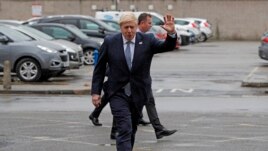14 August, 2019
Britain will leave the European Union with or without a deal on October 31, says British Prime Minister Boris Johnson. Now, some health professionals are saying that leaving the EU without a deal could increase medicine shortages in both the EU and Britain.
Britain's food and drink organization warned last week that the country could also have shortages of some fresh foods if there is a no-deal Brexit.
Pharmaceutical companies have said the same. They are worried about the availability of some medicine. Some have organized flights to bring in supplies if needed.

Britain's Prime Minister Boris Johnson visits Pilgrim Hospital in Boston, north east England, Aug. 5, 2019.
A shortage of medical supplies could also occur beyond Britain.
EU countries receive about 45 million containers of medicines from Britain every month. But some drugs might not have the required regulatory approval in time to be imported from Britain. About 1 billion containers go in one direction or the other each year, industry information shows.
Increased customs controls at ports and other borders between Britain and the EU could also cause shortages. Experts say the controls could slow supplies of drugs and the chemicals needed to produce them.
"A no-deal Brexit risks disruption to the supply of medicines," throughout the EU, Andy Powrie-Smith said. He is an official at the European Federation of Pharmaceutical Industries and Associations.
Drugs in the EU are regulated by the European Medicines Agency (EMA). The agency is the only body that can approve sales of new drugs to treat the most common and serious diseases, including cancer.
It said the EU is prepared for Brexit, and it has final approval for nearly all the 400 drugs that required further clearing. However, approval is not finalized for three medicines that need EU-wide licenses, an EMA official said. He did not identify the drugs.
Increasing problems
Many other medicines approved at the national level could also be at risk. Nearly 6,000 of these drugs will need to go through a new licensing process after Brexit.
The EMA official said the agency did not have "a full picture" of the situation in all EU states for nationally approved medicines.
A survey of 21 European countries showed that all of them had shortages of medicines last year, explained the Pharmaceutical Group of the European Union. They faced problems with production, regulators or distribution. Vaccines were among the drugs most often in short supply.
Eric Van Nueten is the head of a large medicine business in Belgium that supplies medicine to stores. He noted the industry will see some problems and delays if Britain leaves without a deal. "But I think we will be able to manage," he added.
I'm Susan Shand.
The Reuters News Agency reported this story. Susan Shand adapted it for VOA Learning English. Kelly Jean Kelly was the editor.
Write to us in the Comments Section or on 51VOA.COM.
____________________________________________________
Words in this Story
pharmaceutical – n. a drug or medicine
regulate – v. to bring (something) under the control of authority
disruption – n. an interruption in the normal progress or activity
license – n. an official document, card, etc., that gives you permission to do, use, or have something